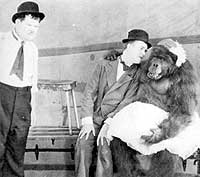Nonsense and sensibility
 At times like this, I really admire the French. The huge turnout at their presidential election puts the UK to shame. And, as a bonus, the losing side likes to throw in a riot with complementary burning car. Here in Britain, defeated voters retire to their homes, have a cup of tea and resolve not to grumble.
At times like this, I really admire the French. The huge turnout at their presidential election puts the UK to shame. And, as a bonus, the losing side likes to throw in a riot with complementary burning car. Here in Britain, defeated voters retire to their homes, have a cup of tea and resolve not to grumble.
It's unsurprising then that there’s nary a whimper at the non-news of Tony Blair’s resignation. Any crowds that emerge upon his real departure in June will either be hired from Yellow Pages or protesting about the Iraq war.
The great British public like to complain over the phone, or in writing (I include email), rather than with petrol bombs (unless they are of the pit bull / fags in bed / Burberry baseball cap breed), particularly about things that don’t really matter - take a look at the top 10 list of most-complained-about ads.
Racism and anything that definitely incites violence are lines that shouldn’t be crossed in advertising, and I’m hard-pressed to see anything that is as clear-cut as that in this list. What it tells me is that people’s sensitivity barometers are wildly different. Perhaps we’ve diverged from the 1970s when, as the BBC points out, it was "sex depravity, pornography and general sleaziness" that offended.
I suggest that language plays its part, and this government is largely responsible for it. Seemingly innocuous phrases used by our masters have shed their innocence to sound sinister, threatening or deceitful. As a consequence, maybe we are too ready to detect double-meanings and imagined insults.
Blair’s resignation, neatly coinciding with the ASA list, prompted the Daily Telegraph to publish this list of “100 names and phrases you’d probably never heard before 1997”. I challenge any British resident to read the list and not experience an emotional response to at least half of those words.
Examples – ASBO, Burying bad news, Congestion charge, Hoodies…
I can feel my teeth grinding already.





No comments:
Post a Comment